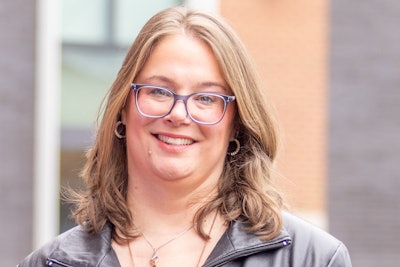Roanoke College students will soon get the opportunity to learn and even earn a degree in cannabis studies, after approval from school faculty.  Dr. DB Poli
Dr. DB Poli
This will make Roanoke College the first college in Virginia to offer a four-year degree in the field of cannabis studies, according to the school.
Come this August, students will be able to declare either a major or a minor in cannabis studies. Awaiting them in the program are two tracks: one on the science of cannabis and the other on the social justice and policy around cannabis.
The science track will teach students about the biology, botany, and chemistry of cannabis, while the social justice and policy track will dive into matters of relating to the history and governmental regulations.
Although students will learn more about different topics depending on which track they eventually choose, all program participants will receive the same core education at first, said biology professor Dr. DorothyBelle “DB” Poli, lead designer for Roanoke’s cannabis studies program and soon-to-be program director.
“Natural scientists should understand the social context and human implications of what they're studying; humanists and social scientists need to be scientifically literate to better understand and communicate about scientific issues that have an impact on how we live our lives,” said Dr. Kathy Wolfe, vice president for academic affairs & dean of the college at Roanoke.
As early as the program’s first course, students will be taught about policy issues, incarceration, criminal justice, and racial bias as it relates to cannabis, Poli said.
"We really want to approach the bias that came from using the word, 'marijuana,' a seriously racially charged word that unfortunately the law has held onto,” Poli said. “The plant as a whole is so much more than just a stereotype. It's culturally placed for people. It's who they are spiritually, it's who they are as a group of people from particular places.
“That needs to be approached with all of the care in the world and a better understanding. By doing that, you're taking all of [those] angry, hateful stereotype problems and you're reframing them. You're changing that narrative to a true historical perspective."
But that’s not the only bias that surrounds cannabis, Poli said. Historically, in the realm of scientific literature and research, government funding around the substance was mostly given to look at the plant’s potential negative consequences, she said.
This program presents an opportunity to help rectify that and also to understand the lasting impact that cannabis has had on human history and evolution, she said.
The idea to create a cannabis studies program at the Salem, Virginia school came from a faculty discussion in 2022 about out-of-the-box curriculum ideas. The suggestion of looking into cannabis came as a surprise to Poli, she said.
“I think my mouth unhinged,” she said. “Roanoke College is a small liberal arts school in the middle of a very red part of the state. We're in the South, and we're a religious-affiliated, Lutheran school.”
National support for the legalization of marijuana usage hit a record-high of 70% this year, with more than half of respondents from all major subgroups – such as gender, age, race/ethnicity, education, and ideology – in favor, according to findings from Gallup. Conservatives voiced the least support, with only 52% of those asked voicing support for legalization.
Similarly in 2022, the Pew Research Center put the percentage of U.S. adults in favor of legalization at 88% – 59% supported legalization for both medical and recreational use. According to U.S. News & World Report, recreational marijuana is legal in 24 states, along with Washington, D.C. and Guam. Virginia, where Roanoke College is located, is one of them.
Despite 2021 legislation allowing adults age 21+ to possess up to 1 ounce of recreational marijuana and grow up to four plants, in Virginia there is no framework for retail sales of cannabis yet, though efforts are being made.
Roanoke’s program is designed to prepare students for careers in the cannabis industry, which involves knowing how to navigate tax law in the business, Poli said.
“I anticipate that most students who graduate with one of these degrees will look to move into careers in the cannabis industry, but those who wish to enter a graduate program will be well-prepared and supported in doing so,” said Wolfe.
One of Roanoke’s goals for the program is for it to become a “think-tank” and leader in this field, so that it can be promptly responsive to changes in the industry, Poli said. As part of that pursuit, she also said that she wanted to establish a physical center to which the program can invite experts and industry leaders.
“I think [the faculty vote] passed because people realize that cannabis isn't going anywhere,” Poli said. “It's a big business. We need to be better preparing the students of our charge for the real world. They also have that interest. Students are very interested in this concept, so the demand is there."















